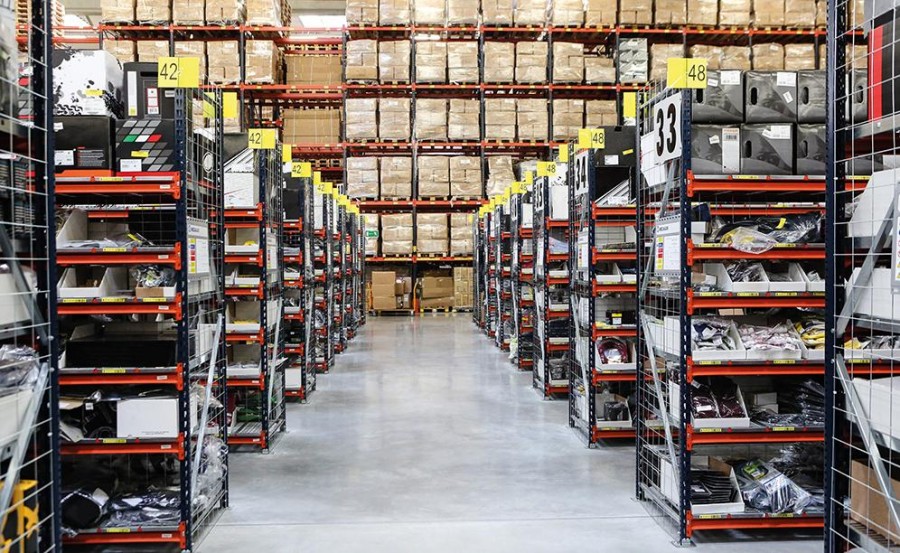Growth in the UK manufacturing sector eased during May, as rates of expansion in output, new orders and employment all decelerated.
The slowdown was driven by weaker growth of domestic demand, lower intakes of new export work and ongoing disruption caused by stretched supply chains, rising cost pressures and the war in Ukraine.
The seasonally adjusted S&P Global / CIPS UK Manufacturing Purchasing Managers’ Index (PMI) posted 54.6 in May, unchanged from the earlier flash estimate and down from 55.8 in April. The PMI – which is calculated from five sub[1]indices – has remained above the neutral 50.0 mark for 24 months.
Manufacturing output increased at the slowest pace since October 2021. The performance of the consumer goods industry was especially weak, with production falling for the first time in 15 months. Growth slowed at intermediate goods producers, but accelerated in the investment goods category.

May saw the weakest increase in new work received during the current 16-month sequence of expansion. Supply chain issues, subdued client confidence, signs of economic slowdown and reduced export order intakes all stymied new order growth. New orders declined in both the consumer and intermediate goods sectors.
The downturn in the former also reflected the impact on consumer demand of the current cost of living crisis. Investment goods producers saw new work intakes rise at a quicker pace.
May saw new export orders decline for the eighth time in the past nine months. Companies attributed lower inflows of new work from overseas to Brexit difficulties, transportation delays, shipping disruptions and the loss of orders due to the war in Ukraine Weaker growth of new orders led to reduced backlogs of work and increased holdings of finished goods inventory.
Stock levels rose due to intentional replenishment and delays in the despatch of finished goods to clients. Stretched global supply chains and the associated scarcity of certain inputs also contributed to input price increases and rising levels of purchasing to build-up safety stocks. Input cost inflation stayed substantial in May, easing from April's near-survey record high.
Chemicals, energy, food, freight, fuels, gas, metals, oil, plastics, polymers, timber, and transportation (air, land and sea) were all reported as being up in price. China lockdowns, exchange rate factors, sanctions on Russia, the war in Ukraine, supply chain disruption and raw material scarcity also drove up purchasing costs.
Part of the increase in input costs was passed on to clients in May. Selling prices rose at a rate close to April's survey-record high. The increase was linked to inflationary pressures, material shortages and rising labour and energy costs. Input buying activity rose for the sixteenth consecutive month in May, while stocks of purchased goods rose at the quickest pace in three months.
Rising demand for materials combined with stretched global supply chains led to longer delivery times from vendors. That said, lead times increased to the weakest extent in over a year-and-a-half, suggesting that the pressure on supply chains was past its peak. UK manufacturing employment rose for the seventeenth successive month in May, albeit at the slowest pace since last October. The outlook for the sector remained positive, with 55% of manufacturers expecting output to rise over the coming year. However, confidence slipped to a 17-month low, amid fears of a possible global recession, rising cost pressures and stretched world supply chains.
Rob Dobson, Director at S&P Global Market Intelligence, said: “The rate of expansion in UK manufacturing output eased to a seven-month low in May as companies face a barrage of headwinds. Factories are reporting a slowdown in domestic demand, falling exports, shortages of inputs and staff, rising cost pressures and heightened concern about the outlook given geopolitical uncertainties.
“The consumer goods sector was especially hard hit, as household demand slumped in response to the ongoing cost of living crisis. With both input costs and selling prices rising at rates close to April's peaks, the surveys suggest that there is no sign of the inflationary surge abating any time soon. Manufacturers continue to report issues getting the right materials, at the right time for the right price, and energy prices remain a major concern.
“Forward-looking indicators from the survey suggest that a further slowdown may be in the offing. Business optimism dipped to a 17-month low and weaker demand growth led to surplus production, meaning warehouse stock levels are rising. Any reversal of this stock-building trend could reinforce the drag of other headwinds and add to downside risks to the outlook.”
Duncan Brock, Group Director at the Chartered Institute of Procurement & Supply: “A softening in overall output growth amongst manufacturing companies in May revealed the slowest rate of expansion since October as supply chain managers pointed to war disruptions and unrelenting price hikes as reasons for this unwelcome trend.
“Though new order levels rose for the sixteenth month they were noticeably softer and driven largely by the domestic market. Export levels fell, hindered by Brexit customs controls and general global disruption. This was especially evident in the consumer goods sector which suffered a sharp fall in overall output as nervous consumers concerned about rising food and energy costs reined back their spending.
“Though the strain on vendor performance eased there is little in this month’s figures to encourage the manufacturing sector and optimism fell to a 17-month low. Suffering a potent cocktail of more disruptions, rising cost pressures and a go-slow UK economy, businesses will be on a knife edge that any business decisions will be the right ones for the coming months.”




















